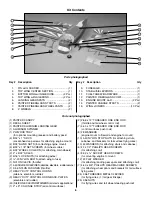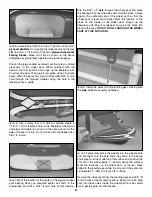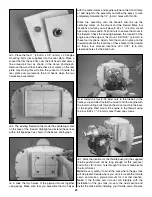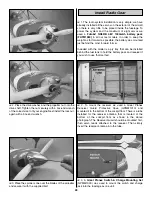
❏
5. Next locate the four predrilled holes in the outer panels of
the top of the bottom wing. See the exact locations and
orientations of the brackets in the following two photographs.
❏
6. Again, using the technique described on Page 8, install
the four 110-degree compound bend metal brackets
(Bracket B as shown above) in place with four #4 x 1/2"
(13mm) wood screws as shown in the photos above.
❏
7. Locate the two painted metal cabane struts. Temporarily
and loosely place two 4-40 x 1/2" (13 mm) Socket Head Cap
Screws through the holes in the top of the cabane struts and
hold them both together with two 4-40 Nylon Stop Nuts. Do not
tighten them at this time. Make sure that you have the
orientation of the cabanes correct as shown in the
photographs. Locate the four predrilled holes in the top of the
fuselage. Again, using the same technique described on
page 8 that you used for attaching the wing brackets, install the
cabane assembly exactly as shown in the photographs above
using four #4 x 1/2" (13mm) wood screws.
❏
8. Attach the top wing by first removing the two temporary
4-40 x 1/2" (13mm) Socket Head Cap Screws from the top
of the cabane struts and re-inserting them through one
cabane strut hole. Then continue through the two 90 degree
brackets mounted in the top wing, and then back through
the remaining cabane hole. Next, install 4-40 nylon stop
nuts onto the 4-40 x 1/2" (13mm) Socket Head Cap Screws.
Notice in the above photograph that the cabane struts fit on
the outside of the two 90-degree brackets. Do this for both
mounting points.
❏
9. Locate the two interplane struts; note that there is a left
and right. This is determined by the contour angles on the
top and bottom of each interplane strut, which allow them to
fit properly against the wing.
With the bottom wing still attached to the fuselage, position
the struts on the outboard sides (toward the wing tips) of the
70-degree compound bend metal brackets on the bottom of
the top wing and the 110-degree compound bend metal
brackets on the top of the bottom wing.
❏
10. For location of the interplane struts on the bottom
wing, measure from the TE of the aileron to the rear tip of
15
















































